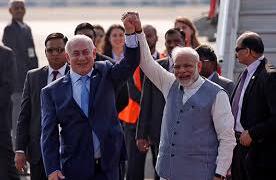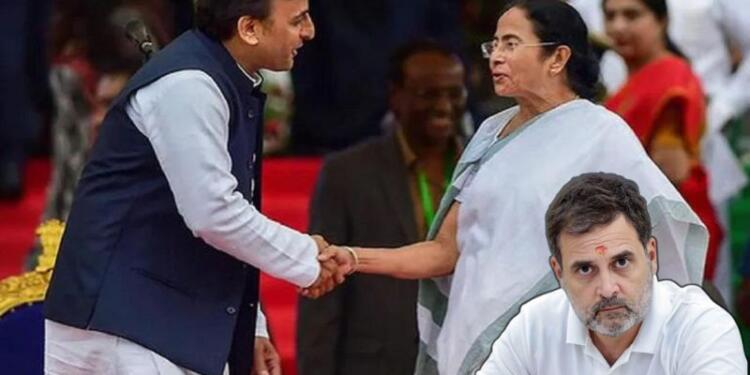The continuing political drama over the so-called Gautam Adani bribery case has uncovered the fragile dynamics within the I.N.D.I. alliance, bringing out deep-seated tensions and strategic divergences between the opposition parties. While the Congress party, led by Rahul and Priyanka Gandhi, continues its rhetorical charge against the Adani Group, other alliance partners like the Trinamool Congress and Samajwadi Party have ditched their alliance partner in its anti-Adani crusade.
With the protests, marked by Congress MPs wearing ‘unparliamentary’ jackets with slogans like “Modi Adani Ek Hai, Adani safe hai,” Rahul Gandhi’s tirade against the Adani group took a new flight but an isolated one at that.
However, the tactic raises serious questions about the credibility and motivation behind such a move. The timing of the US indictment and the following parliamentary disruptions reveal a deliberate political strategy to hijack attention from other critical issues plaguing the country like the draconian powers of the Waqf Boards, menace of illegal immigration among others. By brushing such alarming issues under the carpet, the Congress party has been scripting new lows in Muslim appeasement.
Allegations against the Adani Group related to bribes to Indian government officials for a solar power contract between 2020-2024 must be fully investigated by competent authorities but extraterritorial application of law should be resisted and there should not be such a brazzen hurry to jump to a pre-drawn conclusion – guilty judgement.
Also Read: George Soros and US Link Behind OCCRP’s Attack on Adani Group Exposed
However, Congress’ tactics seem more designed for sensationalized stories rather than accountability. It is nothing but selective anger and an attempt to villainize one of India’s prominent business groups, the quintessence of ultra-leftist propaganda and populist rhetoric that reduces economic interaction into simplistic terms.
While Rahul Gandhi’s Congress hoped to galvanise the country around their Adani Hysteria, they must have been left red faced when TMC and SP not only ditched them but also delivered a major blow to their narrative.
“We have other issues to highlight,” said Trinamool MP Kirti Azad.
TMC skips I.N.D.I.A bloc’s protest against Adani.
Make Mamata Banerjee the leader of I.N.D.I.A bloc: TMC MP Kirti Azad speaks to @pragyakaushika@RishabhMPratap with more inputs on the story. pic.twitter.com/xHEWITCwQI
— TIMES NOW (@TimesNow) December 3, 2024
Similarly, Samajwadi Party’s Ram Gopal Yadav refused to take a more assertive stand. It means these leaders and parties admitted that there are other issues which are more related to the common people of this country.
The broader geopolitics of this anti-Adani saga cannot go unaddressed. Adani’s apparent loss to Chinese companies in Nigeria is more than merely a corporate defeat; it could be a harbinger of possible challenges to Indian geopolitics. This context is quite amiss in the discourse presented by the Congress party, which seems more engaged in creating a political theatre rather than understanding the subtle and complicated economic and strategic tapestries.
This blanket charge against the Adani Group and the insinuation that all wealth accumulation is suspicious also show dangerous populist rhetoric. The very simplistic narrative that “if someone is rich, he must be a thief” does not do justice to the complexities of business growth and economic development. Transparency and accountability are essential, but unbridled targeting of industrialists can have chilling effects on entrepreneurship and economic innovation.
Also Read: Adani Group vs. Global and Domestic Forces: A Fight to Protect India’s Economic Integrity
The Congress party’s approach also betrays a stunning hypocrisy. The selective outrage that considers Adani money “tainted” only in BJP-ruled states exposes the political motivation behind these allegations. Congress did not utter a single sentence when it came to doing business with the Congress-led government in states. The allegations of bribery include four non-NDA states – Odisha, Tamil Nadu, Andhra Pradesh and Chhattisgarh- which Congress-led I.N.D.I. Alliance parties or third front parties ruled during the time of the alleged crime, which is pure hypocrisy and exhibits the dual nature of the Congress and Rahul Gandhi.
In order to thrive long and high on the international stage, booming business from any country is a prerequisite. Since 2014, India’s rising on the geopolitical landscape is undeniable fact. This is not only because of the excellent diplomacy and foreign policy but also because of growing Indian business around the world – Adanis, Ambanis and other business people are also part of that boom.
Countries favour their business abroad because they represent 2nd tier diplomacy and carry soft power, the way US brands- McDonalds, KFC and Apple, Japan’s Toyota and Sony, and South Korea’s Samsung carry their soft power. Similarly, Adani carries ‘providing energy’ as a soft power tool abroad. Hence, it becomes imperative for Congress not to divert the Parliament, and they should stop maligning India on the global stage, otherwise it will end-up hurting India’s interest abroad.
Such a chauvinistic approach further reduces the credibility of their claims and appears to be a politically motivated witch hunt rather than an earnest pursuit of justice.
Rahul Gandhi’s solo march from Parliament to the streets underlines the further isolation of the Congress party within the opposition bloc. In an effort to project a united front, the I.N.D.I. alliance is becoming increasingly fractured, with each party prioritizing its distinct political narratives and regional considerations.
The Adani controversy needs a balanced, transparent, and comprehensive investigation. However, this should be done through established legal mechanisms and not through media trials or parliamentary disruptions. The hasty creation of a sensationalist narrative risks undermining the very principles of fair investigation and due process.
The current political discourse over the Adani issue reflects more of political opportunism rather than a genuine pursuit of accountability. The approach of the Congress party risks making more noise than substance and might even divert attention away from critical national priorities and legislative responsibilities. A balanced, evidence-based approach with respect for legal processes and a lack of sensationalism would serve the nation’s interest far better.

























